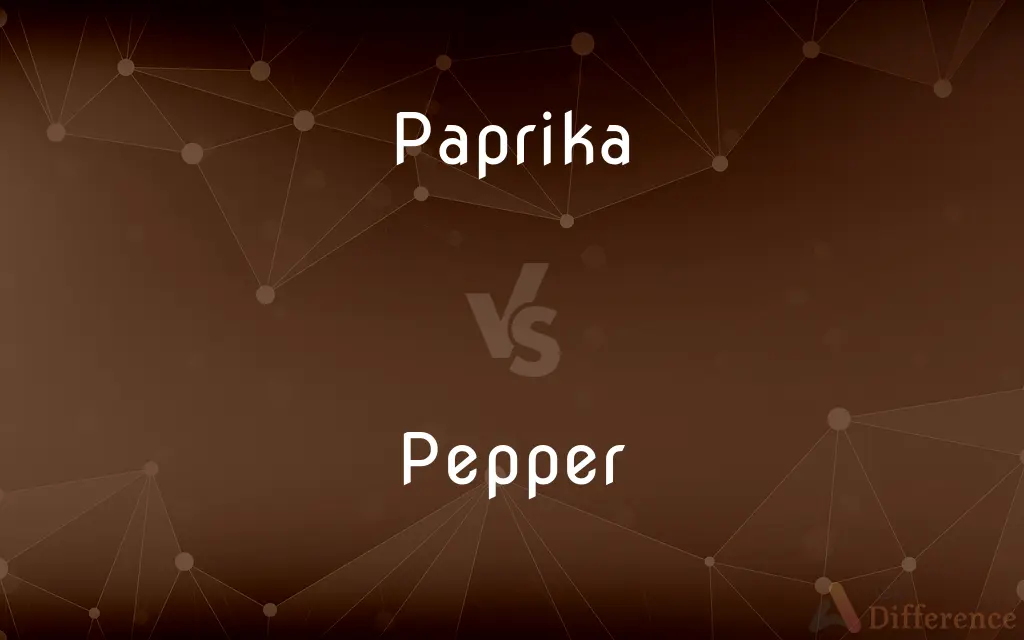Paprika vs. Pepper — What's the Difference?
By Tayyaba Rehman & Urooj Arif — Updated on April 22, 2024
Paprika is a ground spice made from dried red peppers, offering a mild to sweet flavor profile, while pepper typically refers to ground black peppercorns, known for their sharp, spicy taste.

Difference Between Paprika and Pepper
Table of Contents
ADVERTISEMENT
Key Differences
Paprika is derived from a variety of pepper plants, specifically Capsicum annuum, and is used to add color and flavor to dishes, whereas black pepper comes from the dried berries of the Piper nigrum plant and is used primarily for its flavor and as a seasoning.
The flavor of paprika can range from sweet and mild to hot, depending on the type of peppers used, while black pepper is universally known for its pungent and spicy flavor that adds both heat and depth to dishes.
Paprika is often used in its powdered form to garnish and season foods like soups, stews, and meats, on the other hand, black pepper is typically used in a ground form and added to virtually every savory dish.
In terms of color, paprika adds a vibrant red hue to dishes, enhancing the visual appeal, whereas black pepper adds a subtle speckled appearance with no significant color change.
While paprika is a staple in Hungarian and Spanish cuisines, black pepper is used globally and is considered an essential spice in cuisines around the world.
ADVERTISEMENT
Comparison Chart
Origin
Made from dried peppers
Made from dried peppercorns
Flavor Profile
Mild to sweet, sometimes hot
Sharp, spicy
Common Uses
Garnishing, coloring
General seasoning
Color Contribution
Adds red hue
Adds no color, only specks
Cultural Association
Central and Eastern Europe
Worldwide
Compare with Definitions
Paprika
Common in European cuisine.
Paprika is a staple in many Spanish dishes like paella.
Pepper
Ground from black peppercorns.
Freshly ground pepper was added to the soup for extra flavor.
Paprika
A ground spice from dried red peppers.
She sprinkled paprika on the deviled eggs for a pop of color and flavor.
Pepper
Universal seasoning.
Pepper is used in nearly every savory dish around the world.
Paprika
Used for color and mild flavor.
Paprika is essential in making Hungarian goulash.
Pepper
Known for its sharp and spicy taste.
He seasoned the steak generously with black pepper.
Paprika
Often smoked or plain.
Smoked paprika was used to enhance the barbecue sauce.
Pepper
Enhances both flavor and digestion.
Pepper not only improves the taste but also aids in digestion.
Paprika
Ranges in heat and sweetness.
For a spicier kick, she used hot paprika in her recipe.
Pepper
Can be used whole or ground.
Whole peppercorns are essential for a proper peppercorn sauce.
Paprika
Paprika (American English more commonly (listen), British English more commonly (listen)) is a spice made from dried and ground red peppers. It is traditionally made from Capsicum annuum varietals in the Longum group, which also includes chili peppers, but the peppers used for paprika tend to be milder and have thinner flesh.
Pepper
A perennial climbing vine (Piper nigrum) native to India, widely cultivated for its long slender spikes of small fruit.
Paprika
A powdered spice with a deep orange-red colour and a mildly pungent flavour, made from the dried and ground fruits of certain varieties of pepper.
Pepper
A pungent black or white spice produced from the dried fruit of this plant, used as a condiment.
Paprika
A powdered seasoning made from sweet red peppers, ranging in flavor from mild to hot.
Pepper
Any of several other plants of the genus Piper, such as cubeb, betel, and kava.
Paprika
A dark to deep or vivid reddish orange.
Pepper
Any of several tropical American, cultivated varieties of capsicum, having podlike, many-seeded, fruit.
Paprika
(uncountable) Powdered spice made from dried and ground fruits of sweet pepper (bell pepper) or chili pepper (cultivars of Capsicum annuum), or mixtures of these (used especially in Hungarian cooking).
Pepper
The podlike fruit of any of these plants, varying in size, shape, color, and degree of pungency, with the milder types including the bell pepper and pimiento, and the more pungent types including the habanero.
Paprika
(countable) A variety of the spice.
Pepper
Any of various condiments made from the more pungent varieties of capsicum, such as cayenne pepper, tabasco pepper, and chili. Also called hot pepper.
Paprika
A dried but not yet ground fruit of sweet pepper (bell pepper) or chili pepper sold for use as a spice.
Pepper
Any of various other plants producing pungent fruits, such as the Szechuan pepper.
Paprika
A bright reddish orange colour resembling that of the ground spice.
Pepper
(Baseball) A warm-up exercise in which players standing a short distance from a batter field the ball and toss it to the batter, who hits each toss back to the fielders. Also called pepper game.
Paprika
Of a bright reddish orange colour, like that of the dried paprika.
Pepper
To season or sprinkle with pepper.
Paprika
The dried ripened fruit of Capsicum annuum or various other species of pepper; also, the mildly pungent condiment prepared from it.
Pepper
To sprinkle liberally; scatter
Peppered the confetti over the street.
Paprika
Plant bearing large mild thick-walled usually bell-shaped fruits; the principal salad peppers
Pepper
To strew something over
"Large splinters and chunks of timber peppered the ground" (John Guy).
Paprika
A mild powdered seasoning made from dried pimientos
Pepper
To strike with small missiles or gunfire.
Pepper
A plant of the family Piperaceae.
Pepper
(uncountable) A spice prepared from the fermented, dried, unripe berries of this plant.
Pepper
A bell pepper, a fruit of the capsicum plant: red, green, yellow or white, hollow and containing seeds, and in very spicy and mild varieties.Surely "pepper" covers all varieties as in most of this definition, while "bell pepper" and "capsicum" only refer to the large roundish mild varieties specifically
Pepper
(baseball) A game used by baseball players to warm up where fielders standing close to a batter rapidly return the batted ball to be hit again
Some ballparks have signs saying "No pepper games".
Pepper
(cryptography) A randomly-generated value that is added to another value (such as a password) prior to hashing. Unlike a salt, a new one is generated for each value and it is held separately from the value.
Pepper
(transitive) To add pepper to.
Pepper
(transitive) To strike with something made up of small particles.
Pepper
(transitive) To cover with lots of (something made up of small things).
After the hailstorm, the beach was peppered with holes.
Pepper
(transitive) To add (something) at frequent intervals.
He liked to pepper his conversation with long words.
Pepper
To beat or thrash.
Pepper
A well-known, pungently aromatic condiment, the dried berry, either whole or powdered, of the Piper nigrum.
Pepper
The plant which yields pepper, an East Indian woody climber (Piper nigrum), with ovate leaves and apetalous flowers in spikes opposite the leaves. The berries are red when ripe. Also, by extension, any one of the several hundred species of the genus Piper, widely dispersed throughout the tropical and subtropical regions of the earth.
Pepper
Any plant of the genus Capsicum (of the Solanaceae family, which are unrelated to Piper), and its fruit; red pepper; chili pepper; as, the bell pepper and the jalapeno pepper (both Capsicum annuum) and the habanero pepper (Capsicum chinense); . These contain varying levels of the substance capsaicin (C18H27O3N), which gives the peppers their hot taste. The habanero is about 25-50 times hotter than the jalapeno according to a scale developed by Wilbur Scoville in 1912. See also Capsicum and http://www.chili-pepper-plants.com/.
Pepper
To sprinkle or season with pepper.
Pepper
Figuratively: To shower shot or other missiles, or blows, upon; to pelt; to fill with shot, or cover with bruises or wounds; as, to pepper him with buckshot.
Pepper
To fire numerous shots (at).
Pepper
Climber having dark red berries (peppercorns) when fully ripe; southern India and Sri Lanka; naturalized in northern Burma and Assam
Pepper
Any of various tropical plants of the genus Capsicum bearing peppers
Pepper
Pungent seasoning from the berry of the common pepper plant of East India; use whole or ground
Pepper
Sweet and hot varieties of fruits of plants of the genus Capsicum
Pepper
Add pepper to;
Pepper the soup
Pepper
Attack and bombard with or as if with missiles;
Pelt the speaker with questions
Common Curiosities
What are the health benefits of using paprika?
Paprika is rich in antioxidants and vitamins A and E.
How does the flavor of paprika differ from pepper?
Paprika ranges from sweet to mildly hot, whereas pepper is sharply spicy.
What is a common use of black pepper in cooking?
It is used universally as a seasoning to enhance flavor.
What is paprika made from?
Dried peppers of the Capsicum annuum variety.
Can paprika replace pepper in recipes?
Not usually, as their flavors and roles in cooking are quite different.
Is black pepper beneficial for health?
Yes, it aids digestion and has antioxidant properties.
What's the best way to store paprika and pepper?
Both should be stored in a cool, dark place to maintain their potency.
Can the spiciness of paprika match that of black pepper?
It can, particularly in its hotter varieties, though the types of heat differ.
Why might chefs choose paprika over pepper?
For its color and specific flavor profile suited to certain dishes.
Which cuisines prominently use paprika?
Hungarian, Spanish, and parts of Eastern Europe.
How are paprika and pepper harvested differently?
Paprika peppers are air-dried, while peppercorns are dried in the sun or mechanically.
Are there different types of paprika?
Yes, including sweet, smoked, and hot varieties.
How does black pepper influence the taste of food?
It adds a spicy, bold dimension to dishes.
Share Your Discovery

Previous Comparison
Mandatory vs. Compulsory
Next Comparison
Booking vs. ReservationAuthor Spotlight
Written by
Tayyaba RehmanTayyaba Rehman is a distinguished writer, currently serving as a primary contributor to askdifference.com. As a researcher in semantics and etymology, Tayyaba's passion for the complexity of languages and their distinctions has found a perfect home on the platform. Tayyaba delves into the intricacies of language, distinguishing between commonly confused words and phrases, thereby providing clarity for readers worldwide.
Co-written by
Urooj ArifUrooj is a skilled content writer at Ask Difference, known for her exceptional ability to simplify complex topics into engaging and informative content. With a passion for research and a flair for clear, concise writing, she consistently delivers articles that resonate with our diverse audience.















































